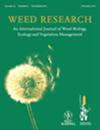Influence of environmental factors on seed germination and seedling emergence of Amaranthus blitoides S. Watson and A. hybridus L.
IF 2.2
3区 农林科学
Q2 AGRONOMY
引用次数: 0
Abstract
Amaranthus blitoides S. Watson and A. hybridus L. are common herbaceous annual summer weeds in different regions of Iran, which produce a large number of small seeds per plant. The goal of these experiments was to determine seed germination cardinal temperature and investigate the effect of constant temperature, osmotic and salt stresses, stratification, flooding duration, after‐ripening and seed planting depth on seed germination and seedling emergence. Two‐piece segmented, dent‐like and beta four‐parameter models were used to investigate the relationship between germination rate and constant temperature. The dent‐like model showed the best description of the effect of constant temperature on seed germination rate of both A. blitoides and A. hybridus. Optimal seed germination of A. blitoides occurred at 35°C, but in A. hybridus optimum germination was observed in a range of constant temperatures from 30 to 40°C. Osmotic and salt stresses and flooding adversely affected seed germination of both species. After ripening for 6 months increased germination percentage of both A. blitoides and A. hybridus. Maximum seedling emergence of A. blitoides (42.8%) and A. hybridus (44.9%) occurred at a planting depth of 3.3 cm, whereas further increased planting depth minimized seedling emergence of both weeds. Information obtained from this study will help us to develop effective techniques for management of A. blitoides and A. hybridus.环境因素对Amaranthus blitoides S. Watson和A. hybridus L.种子萌发和出苗的影响
苋属(Amaranthus blitoides S. Watson)和苋属(A. hybridus L.)是伊朗不同地区常见的一年生夏季草本杂草,每株产生大量小种子。这些实验的目的是确定种子萌发心温度,并研究恒温、渗透胁迫和盐胁迫、层积、淹水时间、后熟和播种深度对种子萌发和出苗的影响。研究采用了两片分割模型、齿状模型和贝塔四参数模型来研究发芽率与恒温之间的关系。齿状模型最好地描述了恒温对蓟马和杂交蓟马种子萌发率的影响。A.blitoides的最佳种子萌发温度为35°C,而A.hybridus的最佳萌发温度为30至40°C。渗透胁迫、盐胁迫和洪水对两种植物的种子萌发都有不利影响。经过 6 个月的成熟期后,A. blitoides 和 A. hybridus 的发芽率都有所提高。在种植深度为 3.3 厘米时,禾本科杂草的出苗率最高(42.8%),杂草的出苗率最低(44.9%)。这项研究获得的信息将有助于我们开发有效的技术来管理蓟马和杂交蓟马。
本文章由计算机程序翻译,如有差异,请以英文原文为准。
求助全文
约1分钟内获得全文
求助全文
来源期刊

Weed Research
农林科学-农艺学
CiteScore
4.30
自引率
0.00%
发文量
41
审稿时长
12-24 weeks
期刊介绍:
Weed Research is an international peer-reviewed journal that publishes topical and innovative papers on weed science, in the English language. Its aim is to publish the best weed science from around the globe and to be the journal of choice for weed science researchers. It is the official journal of the European Weed Research Society. Papers are taken on all aspects of weeds, defined as plants that impact adversely on economic, aesthetic or environmental aspects of any system. Topics include, amongst others, weed biology and control, herbicides, invasive plant species in all environments, population and spatial biology, modelling, genetics, biodiversity and parasitic plants. The journal welcomes submissions on work carried out in any part of the world.
 求助内容:
求助内容: 应助结果提醒方式:
应助结果提醒方式:


